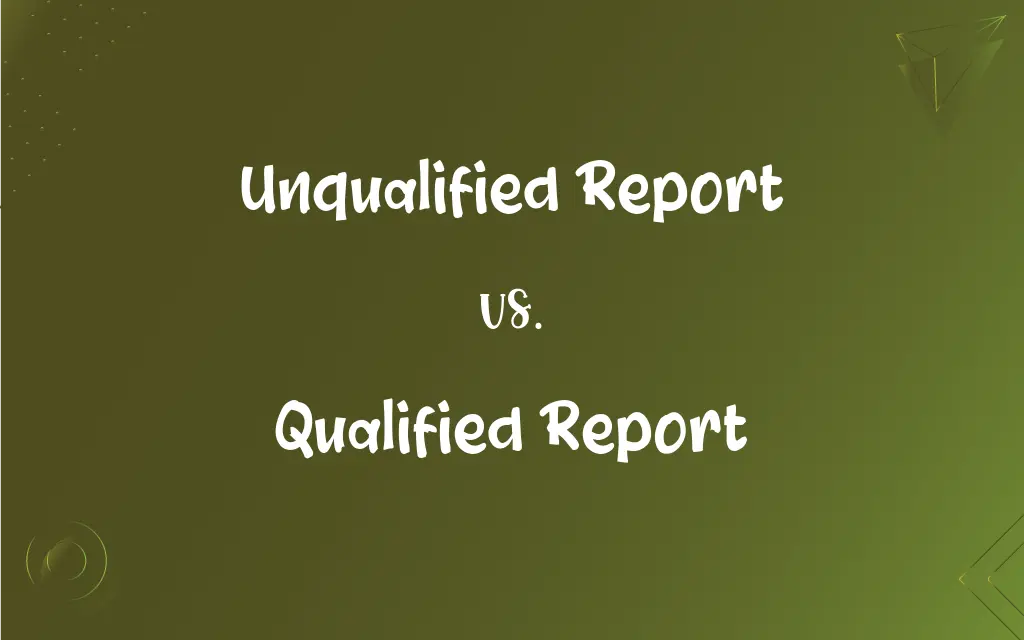Unqualified Report vs. Qualified Report: What's the Difference?
Edited by Aimie Carlson || By Harlon Moss || Published on February 1, 2024
An unqualified report indicates financial statements are fairly presented without reservations, while a qualified report suggests some aspects don't conform to standards.

Key Differences
An unqualified report, often referred to as a clean report, is issued by an auditor when financial statements are found to be free of material misstatements. A qualified report, in contrast, indicates that there are certain exceptions to the standard accounting principles.
In an unqualified report, the auditor expresses an opinion that the financial statements give a true and fair view. In a qualified report, the auditor notes exceptions where the financial statements deviate from generally accepted accounting principles (GAAP).
The issuance of an unqualified report implies that the company's financial records and practices are in compliance with accounting standards. When a qualified report is issued, it suggests limitations or disagreements in certain areas, but these are not severe enough to invalidate the entire report.
An unqualified report is usually the goal for most organizations, as it boosts credibility with investors and stakeholders. A qualified report, while not as severe as an adverse or disclaimer of opinion, can raise concerns about certain aspects of a company's financial health.
Receiving an unqualified report generally reflects positively on a company’s financial integrity. A qualified report, on the other hand, may prompt closer scrutiny from investors, creditors, and regulators.
ADVERTISEMENT
Comparison Chart
Definition
Indicates financial statements are presented fairly without reservations
Indicates exceptions to standard accounting principles
Auditor's Opinion
Reflects true and fair view of financial statements
Notes deviations from GAAP, but not severe enough to invalidate the report
Compliance with Standards
Compliant with accounting standards
Certain limitations or disagreements with standards
Impact on Company
Boosts credibility and confidence among stakeholders
Raises concerns about specific aspects of financial health
Significance
Reflects positively on financial integrity
May lead to closer scrutiny from interested parties
ADVERTISEMENT
Unqualified Report and Qualified Report Definitions
Unqualified Report
Represents the best possible outcome of an audit.
The finance team's goal was to maintain their record of consecutive unqualified reports.
Qualified Report
Reflects limitations or disagreements in an audit.
Due to incomplete records, the company received a qualified report.
Unqualified Report
Suggests financial records are free of significant errors or fraud.
The unqualified report reassured stakeholders of the company's financial integrity.
Qualified Report
Not as severe as an adverse opinion but raises specific concerns.
The qualified report focused on the inadequacy of financial documentation.
Unqualified Report
Auditor's opinion that financial statements are presented fairly.
The company received an unqualified report, indicating sound financial practices.
Qualified Report
May lead to scrutiny from investors and regulators.
After receiving the qualified report, the company faced increased questions from stakeholders.
Unqualified Report
Indicates compliance with accounting standards and principles.
Their unqualified report was a testament to their accurate financial reporting.
Qualified Report
Indicates deviations from GAAP in financial statements.
The qualified report highlighted discrepancies in revenue recognition.
Unqualified Report
Reflects a clean audit with no material misstatements found.
Achieving an unqualified report was crucial for investor confidence.
Qualified Report
Suggests certain aspects of the financial statements are not fully compliant.
The qualified report was issued because of the company's non-standard inventory valuation methods.
FAQs
Why is an unqualified report desirable?
It enhances credibility and confidence among investors and stakeholders.
Can a qualified report affect investor confidence?
Yes, it can lead to reduced confidence due to concerns about financial practices.
What does a qualified report indicate?
It suggests there are exceptions to the standard accounting practices in the financial statements.
Is an unqualified report common?
Yes, it's common for companies with sound financial practices.
What areas can lead to a qualified report?
Areas like revenue recognition, inventory valuation, or inadequate documentation.
Can a qualified report evolve into a worse opinion?
Yes, if issues are not addressed, it could lead to an adverse opinion.
What is an unqualified report?
It's an auditor's opinion that financial statements are fair and comply with accounting standards.
Does an unqualified report mean a company is profitable?
Not necessarily; it just means financial statements are accurately presented.
Can a startup receive an unqualified report?
Yes, if their financial statements are in order and comply with standards.
Does an unqualified report guarantee financial success?
No, it doesn't guarantee success but indicates sound financial reporting.
What causes a qualified report to be issued?
It's issued due to limitations in scope or deviations from accounting principles.
Who decides if a report is unqualified or qualified?
The external auditor makes this determination based on their audit findings.
Can a company with a qualified report get loans easily?
It might be more challenging as it raises concerns about financial health.
How can a company improve from a qualified to an unqualified report?
By addressing the specific areas of concern highlighted in the qualified report.
Are qualified reports common in certain industries?
They can be more common in industries with complex accounting practices.
Does an unqualified report require full transparency?
Yes, it requires transparency and adherence to accounting standards.
How long does a qualified report affect a company?
It can affect until issues are resolved and reflected in subsequent audits.
Are there any benefits to receiving a qualified report?
It identifies areas for improvement, although it's generally less favorable than an unqualified report.
What's the key difference in perception between the two reports?
An unqualified report is seen as a clean bill of health, while a qualified report raises specific red flags.
Can internal audits result in unqualified reports?
Unqualified reports are typically the result of external audits.
About Author
Written by
Harlon MossHarlon is a seasoned quality moderator and accomplished content writer for Difference Wiki. An alumnus of the prestigious University of California, he earned his degree in Computer Science. Leveraging his academic background, Harlon brings a meticulous and informed perspective to his work, ensuring content accuracy and excellence.
Edited by
Aimie CarlsonAimie Carlson, holding a master's degree in English literature, is a fervent English language enthusiast. She lends her writing talents to Difference Wiki, a prominent website that specializes in comparisons, offering readers insightful analyses that both captivate and inform.































































